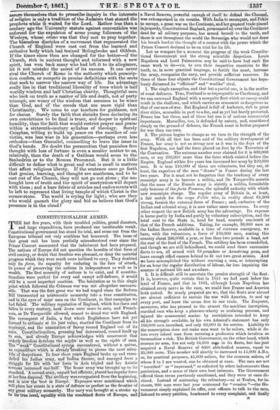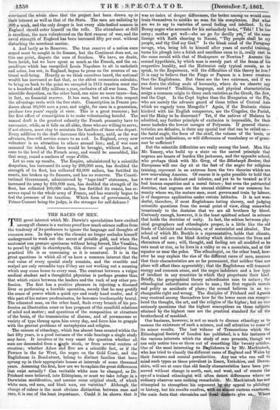CONSTITUTIONALISM ARMED.
THE last five years, with their troubled politics, grand disasters,
.I.. and large expenditure, have produced one inestimable result. Constitutional governmeut has stood its trial, and come out from the European tribunal not only scathless but honoured. The issue of that great suit has been partially misunderstood ever since the Prince Consort announced that the indictment had been prepared. The nations of Europe did not question the henefits of that form of civil society, or doubt that freedom was pleasant, or deny the material progress which they were much more inclined to envy. They doubted only its force, its capacity for enduring in the face of attack, its power of preserving the nations in independence as well as in wealth. The first necessity of nations is to exist, and if constitu- tionalism were perfect for every end except self-defence, it would still be a most imperfect machine. The hesitation as to this single point which followed the Crimean war was not altogether unreason- able. That was the first great war we had waged since the Reform Rill transmuted an aristocratic monarchy into a true constitution, and in the eyes of most men on the Continent, in that campaign we had failed. The military reputation of England, which has risen and fallen in every century, 'Sank down once more to zero, and French- men, as De Tocqueville allowed, ceased to dread war with England. The reconquest of India, a feat which Englishmen have not yet learned to estimate at its just value, startled the Continent from its contempt, and the annexation of Savoy roused England out of its calm. Constitutionalism, groaning but determined, roused itself up to arm, and already Europe acknowledges with amazement that orderly freedom develops the mights as well as the rights of man. The "weak" Constitutional system. encountered, without a quiver, an expenditure which is alrendylreaking to pieces the most scien- tific of despotisms. In four short years England broke up and remo- delled her Indian army, and Indian finance, and emerged from a struggle for life with her force in Asia tripled and her Asiatic revenue increased one-half. The home army was brought up to its standard. A seconclarmy, unpaid bat efficient, placed her regular force at her free disposal. The artillery was reorganized from the beginning, and is now the best in Europe. Expenses were sanctioned which will place her coasts in a state of defence as perfect as the frontier of any great military monarchy. Her navy was brought at a stroke up to its true level, equality with the combined fleets of Europe, and a Naval Reserve, powerful enough of itself to defend the Channel, was extemporized in six months. With India to reconquer, and Pekin to occupy, a great war on the Continent, and her greatest trade placed in jeopardy, Constitutional England, pronounced all over the Continent dead for all military purposes, has armed herself to the teeth, and there is not throughout the world the Sovereign who would not draw his breath hard at the thought of a contest with the power which the Prince Consort declared to be on trial for its life.
Let us compare for a moment the progress of the weak Constitu- tional Government and the strong scientific despotism. Louis Napoleon and Lord Palmerston may be said to have had each the same work to do—via. to arm their respective countries to the teeth, or, in more practical language, to fortify the coast, increase the army, reorganize the navy, and provide sufficient reserves. In three of these four objects the Constitutional Government has hope- lessly distanced its "efficient" and " warlike" rival.
1. The single exception, and that but a partial one, is in the matter of coast defences. True, Portland is as impregnable as Cherbourg, and we can surround England with a mosquito fleet which no enemy could reach in the shallows, and which carries an armament as dangerous as that of our men-of-war. But England is full of harbours, rich in great river cities, accessible in part to a foe, and as yet but barely protected. France has but three, and of these but one is of serious commercial importance. Marseilles, too, is defended by nature, and, considered simply on the ground of defence, the French coast is better prepared for war than our own.
2. The picture begins to change as we turn to the strength of the army. With all that has been said of the military development of France, her army is not so strong now as it was in the days of the first Napoleon, not half the force placed on foot by the Terrorists of the Convention. The extreme number ever claimed for it is 600,000 men, or say 200,000 more than the force which existed before the Empire. England within five years has increased her army by 250,000 men. It is true 150,000 of these are volunteers, but they are, at least, the superiors of the men " drawn" in France during the last two years. For it must not be forgotten that the tendency of every conscript army is to become a militia, and De Tocqueville asserts that the mass of the French army is strictly a militia, formidable only because of the feria Prowess, the splendid audacity with which new conscripts charge. The regular army of Britain is, at least, a fair match for the corps who, in reality about 65,000 strong, furnish the external force of France ; and, exclusive of the Indian and colonial army, it is now rather more numerous. In every other respect the new British army has the advantage. Its expense is borne partly by India and partly by voluntary subscription, and the total cost to the State is, head for head, scarcely one-tenth of that of the French additions. Taking, for example, 30,000 men as the Indian Reserve, available in a time of extreme emergency, we have, with the volunteers, a force of 180,000 men, costing this country about 300,0001. a year, or less than two pounds a head, not the cost of the food of the French. The artillery has been remodelled, and though we are still behiadhand, we could send three successive fleets to sea, all armed with 68-pounders or Armstrong gun% and leave enough rifled cannon behind to fit out two great armies. And we have accomplished this without coercing a man, or interrupting for an hour the regular distribution of labour, far less impairing the sources of national life and numbers.
3. It is difficult still to ascertain the precise strength of the fleet. It is, however, quite certain that ig 1855 we had sunk below the level of France, and that in 1861, although Louis Napoleon has strained every nerve in the race, we could face France and America both united. So nearly prepared are we, that the fleets now abroad are almost sufficient to sustain the war with America, to seal up every port, and leave the ocean free to our trade. The Emperor, moreover, who has pressed to the utmost the maritime inscription, enrolled men who keep a pleasure-wherry as seafaring persons, and injured the commercial marine by restrictions intended to keep all his strength available, by his own Admiral's statement has only 160,000 men inscribed, and only 62,000 fit for service. Liability to the conscription does not make men want to be sailors, while it de- ters every inland man from entering a profession which involves so tremendous a risk. The British Government, on the other hand, which coerces no man, has not only 85,000 mon in its fleets, but has just acquired a Naval Reserve of 8000 able-bodied seamen, equal to 25,000 more. This number will shortly be increased to 15,000 A.B.a, or, for practical purposes, 45,000 sailors, for the common sailors, of whom 2 to 1 are wanted, can be obtained at once. The men are not " inscribed' or " impressed," or collected by other inducements than patriotism, and a sense of their own best interests. The Government offered them terms previously sanctioned, and they were at once de- clined. Instead of sentencing the refractory—as at Toulon, for in- stance, 900 men were last year sentenced for "evasion "—the Go- vernment simply explained its offer, sent officers to talk to the men, listened to every petition, hearkened to every complaint, and finally
convinced the whole class that the project had been drawn up in their interest as well as that of the State. The men are enlisting by 200 a week, and the only danger is lest every able-bodied seaman in England should enter himself on the rolls. The attendance at drill is excellent, the men volunteered on the first rumour of war, and the naval strength of England has been increased fifty per cent. without disturbing the merchant marine.
4. And lastly as to Reserves. The true reserve of a nation once armed must be sought in its finance, but the Continent does not, on this one point, dispute the uses of freedom. We have, no doubt, been lavish, but we have spent as much as the French, and the ex- penditure which has compelled Louis Napoleon to sit in sackcloth and ashes, has not, in England, begun to press on the sources of na- tional well-being. Heavily as we think ourselves taxed, the national wealth has increased so fast that, as the ablest economists calculate, to bring us back to the point we occupied in 1815 taxation must rise to a hundred and fifty millions a year, exclusive of all war loans. The scientific despotism, on the other hand, can raise no more taxes—has, in fact, no financial reserve. It has men, but even in this respect the advantage rests with the free state. Conscription in France pro- ducei about 90,000 men a year, and might, for once in a generation, produce two years' supply at once. This is a great resource; but the first effect of conscription is to make volunteering hateful. The annual draft is the greatest calamity the French peasantry have to encounter, while, as it falls on all alike, those who are willing to serve, if not chosen, must stay to maintain the families of those who depart. Every addition to the draft increases this tendency, until, as the war advances, free-will service comes to an en& In England, every new volunteer is an attraction to others around him; and, if war once menaced the island, the force would be brought, without laws, at once to the level of the French army, and would be assembled, like that army, round a nucleus of corps Let us sum up results. The Empire, administered by a scientific despotism, has increased its army by 200,000 men, has doubled the strength of its fleet, has collected 62,000 sailors, has fortified its coasts, has broken up its finances, and has no reserves. The Consti- tutional Government, administered by "tape-tied" statesmen, has increased its army by 250,000 men, has doubled the strength of its fleet, has collected 100,000 sailors, has fortified its coasts, has re- serves equal to the whole army of France, and has scarcely begun to feel the pressure of its taxation. Which form of government, the Prince Consort being the judge, is the stronger for self-defence ?































 Previous page
Previous page